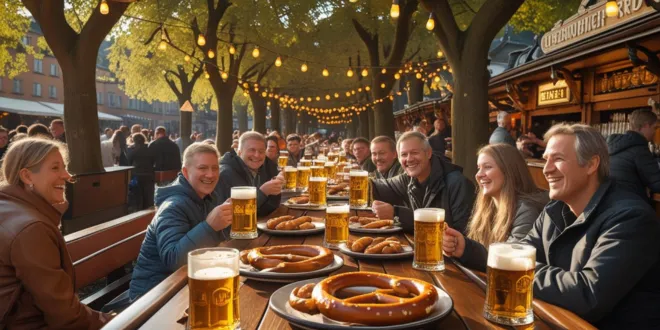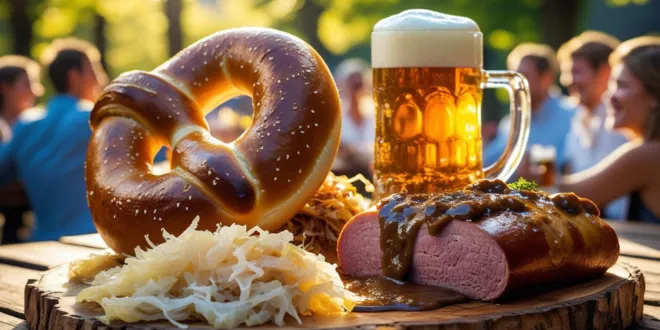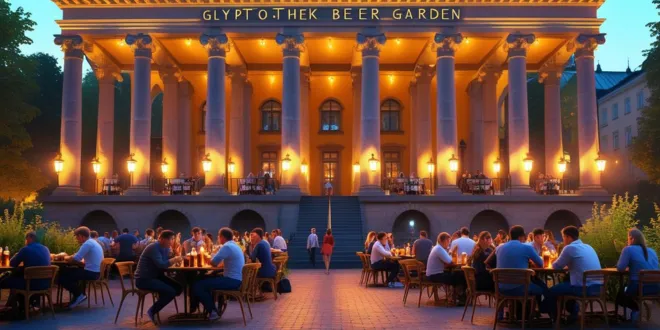Munich is a paradise for any beer lover, where tradition, flavor, and outdoor living come together in its world-famous beer gardens. These aren’t just places to enjoy a cold, golden Maß of authentic Bavarian beer they’re cultural institutions.
The best beer gardens in Munich offer more than just exceptional beer; they provide a unique window into local life, where long wooden tables under chestnut trees become stages for laughter, friendship, and unforgettable moments.
Rooted in centuries-old brewing traditions, these open-air havens celebrate a vibrant community culture that welcomes locals and travelers alike. From lively spots in the English Garden to historic gardens in the city center, each one blends great beer with hearty food and warm hospitality.
Whether you’re a first-time visitor or a seasoned beer enthusiast, discovering Munich’s best beer gardens is a journey into the heart of Bavarian soul one sip at a time.

Best Beer Gardens in Munich: A Local’s Guide
Discovering the best beer gardens in Munich is more than just finding great beer — it’s about experiencing Bavarian life at its most authentic. Locals know that beyond the tourist hotspots, hidden gems offer rich flavors and genuine community culture. From the lively Hofbräuhaus Garden to the peaceful Chinesischer Turm, each spot blends tradition with charm.
These open-air havens serve crisp, fresh beer straight from Munich’s legendary breweries. Whether you’re after historic ambiance or family-friendly spaces, Munich’s best beer gardens welcome all. Come for the beer, stay for the laughter, music, and shared tables where strangers become friends.
Why Munich’s Beer Gardens Are Unique
Munich’s beer gardens stand out globally thanks to their deep-rooted tradition, open-air charm, and vibrant community culture. Unlike typical bars, these spaces invite you to relax under chestnut trees with a cold beer while sharing long tables with locals and travelers alike.
The concept dates back centuries, blending brewing heritage with social life. You’ll find fresh, locally brewed beer served in liter mugs, paired with Bavarian classics. What truly makes them unique is the welcoming atmosphere no reservations, no pretense. In Munich’s best beer gardens, everyone belongs, creating a living tradition where beer isn’t just drunk — it’s celebrated.
Glyptothek Beer Garden: Historic Views and Craft Brews
Tucked beside the ancient columns of the Glyptothek, this gem among Munich’s best beer gardens offers a rare blend of art, history, and exceptional beer. As you sip a perfectly poured Maß, you’re surrounded by neoclassical architecture and views of the Königsplatz. The beer here is crisp and traditional, often from local Munich breweries that uphold centuries-old methods.
More than just a place to drink, it fosters a refined community culture where conversation flows as freely as beer. Smaller than others, it’s ideal for those seeking a quieter vibe. For lovers of culture and craft brews, the Glyptothek beer garden is a must-visit in Munich’s legendary beer scene.
Munich Beer Garden Guide: Where to Drink Like a Bavarian
To drink like a Bavarian, head to Munich’s best beer gardens, where beer isn’t just a drink — it’s a way of life. Locals gather under shady trees, clink glasses with a hearty “Prost!”, and savor pretzels and pork knuckles with pride. The community culture here is inclusive and joyful, built on shared tables and open hearts.
Whether you’re at Augustiner-Keller or the English Garden, you’ll enjoy fresh, golden beer brewed according to the Reinheitsgebot. Skip the beer halls for a day and embrace the outdoors. In Munich’s best beer gardens, every sip connects you to centuries of tradition, friendship, and pure Bavarian joy.
Traditional Bavarian Snacks You Must Try
No beer garden visit is complete without indulging in traditional Bavarian snacks that perfectly complement your beer. From the giant soft pretzel (Laugenbrezn) to crispy pork knuckle (Schweinshaxe) and tangy sauerkraut, each bite is a taste of local heritage. Obatzda, a creamy cheese spread, is a favorite with beer lovers.
These dishes aren’t just food — they’re part of the community culture that defines Munich’s best beer gardens. Eaten at shared wooden tables under chestnut trees, they bring people together. Whether you’re vegetarian or carnivore, there’s something delicious. Pair your snack with a cold Maß, and you’re living like a true Bavarian.
When to Go: Avoiding Crowds and Getting the Best Spot
Timing is key to enjoying Munich’s best beer gardens. Arrive before noon on sunny weekends to secure a good seat by 2 PM, every table is taken. Weekdays offer a quieter experience with the same great beer and community culture. Spring and early autumn are ideal seasons, avoiding both summer crowds and winter closures.
Early evenings are perfect for a relaxed drink as the sun sets. If you visit during Oktoberfest season, expect more tourists, but also more energy. For a local vibe, skip the peak hours. Whether you’re alone or with friends, the right timing ensures you enjoy the beer, food, and atmosphere at its best.

What Is a Beer Garden? Munich’s Tradition Explained
A beer garden is more than just outdoor seating — it’s a Munich institution rooted in history and community culture. Originating in the 1800s, brewers stored beer in cellars under chestnut trees and added tables for customers. Today, Munich’s best beer gardens continue this tradition, serving fresh, local beer in shaded, social spaces.
You’ll find self-service areas, shared tables, and menus full of Bavarian classics. It’s a place where families, friends, and strangers gather over beer and laughter. Unlike pubs or bars, beer gardens emphasize openness, simplicity, and connection. This unique blend of beer, nature, and togetherness defines Munich’s beloved outdoor drinking culture.
The Origins of the Beer Garden: A 19th-Century Bavarian Invention
The beer garden was born in 19th-century Bavaria when brewers dug cellars under chestnut trees to keep beer cool. The trees provided natural shade, and gravel paths prevented dust. Soon, they added benches and tables, creating the first beer gardens. This innovation combined practicality with pleasure, giving locals a place to enjoy fresh beer in nature.
Over time, these spaces evolved into hubs of community culture. Today, Munich’s best beer gardens honor this legacy, serving traditional beer in settings that reflect their historic roots. From humble cellars to cultural landmarks, the beer garden remains a symbol of Bavarian ingenuity, where beer, history, and hospitality flow together.
Why Beer Gardens Were Built Under Chestnut Trees
Chestnut trees were essential to the original beer gardens because their dense canopy provided natural shade, keeping the ground cool — crucial before refrigeration. Beneath them, brewers stored beer in underground cellars to maintain a steady temperature. The trees also have shallow roots, making it easy to build cellars without damaging them.
Gravel paths prevented mud and insects. Over time, these shaded areas became social hubs, forming the foundation of Munich’s community culture. Today, sitting under chestnut trees while drinking fresh beer remains a cherished ritual. In Munich’s best beer gardens, this tradition lives on, blending nature, history, and the perfect Maß of beer.
Community Culture: Where Strangers Become Friends
One of the most beautiful aspects of Munich’s best beer gardens is their community culture — where shared tables break down barriers and strangers become friends. With no reservations, you might sit beside a local family, a solo traveler, or a group celebrating. A simple “Prost!” can start a conversation.
This openness is central to Bavarian life. The focus isn’t just on beer, but on connection. Music, laughter, and regional food enhance the sense of belonging. In this relaxed setting, everyone is welcome. It’s not just about drinking; it’s about sharing moments. That’s the true spirit of Munich’s beer garden culture.
How Beer Gardens Survived Wars, Prohibition, and Modern Times
Despite wars, economic crises, and even alcohol restrictions, Munich’s beer gardens have endured, thanks to their deep role in community culture. During difficult times, they remained places of comfort and connection. Even when resources were scarce, locals protected the tradition of open-air beer enjoyment.
Post-war, they rebuilt and preserved their unique self-service model. In modern times, gentrification and rising costs threatened some gardens, but public support saved them. Today, Munich’s best beer gardens thrive by balancing tradition with sustainability. They’re not just venues — they’re cultural lifelines. With every Maß of beer served, they honor a legacy of resilience, unity, and the enduring love of beer.
How to Visit a Munich Beer Garden: Etiquette & Tips
Visiting a Munich beer garden is easy if you follow a few unwritten rules. First, cash is king — bring euros for beer and snacks. Never reserve a table with your jacket or bag; it’s frowned upon. Instead, arrive early for the best spot.
When toasting, look into the other person’s eyes and say “Prost!” Sharing tables is normal and encouraged it’s part of the community culture. Order at the counter or wave to staff. And don’t rush beer gardens are for relaxing. Whether you’re new to Munich’s best beer gardens or a repeat visitor, respect and a smile go a long way.

Beer Garden vs. Beer Hall: What’s the Difference?
The main difference lies in setting and vibe. Beer gardens are outdoor spaces with long tables under trees, offering fresh air, sunlight, and a relaxed community culture. Beer halls are indoor, often crowded, with loud music and a festive, enclosed atmosphere. Both serve excellent beer, but gardens emphasize nature and openness.
Halls like Hofbräuhaus are great for parties; gardens like Seehaus are ideal for slow afternoons. In Munich’s best beer gardens, you’ll find self-service and family-friendly spaces. Halls usually have full service. Your choice depends on mood — but for authentic beer and togetherness, nothing beats a garden.
Indoor vs. Outdoor: The Key Difference in Setting
The biggest difference between beer gardens and beer halls is the setting: outdoor versus indoor. Munich’s best beer gardens offer a natural, open-air experience under chestnut trees, where sunlight, breeze, and birdsong enhance your beer.
This environment fosters a calm, inclusive community culture. Beer halls, on the other hand, are heated, enclosed spaces perfect for cold days or lively nights. They’re often louder and more tourist-focused. While both serve traditional beer and food, the garden’s outdoor charm creates a deeper connection to Munich’s heritage. For a true taste of local life, the open sky and shared tables of a beer garden are unbeatable.
Atmosphere: Lively Garden Vibes vs. Cozy Hall Warmth
The atmosphere in Munich’s best beer gardens is relaxed, sunny, and full of natural energy — children play, friends laugh, and dogs nap under tables. It’s a place to breathe, sip beer, and enjoy the rhythm of community culture. In contrast, beer halls offer cozy, candle-lit warmth with brass bands and clinking glasses, creating a festive, indoor buzz. Gardens feel democratic and open; halls feel theatrical and intense.
Both are joyful, but gardens emphasize connection with nature and people. Whether you crave fresh air or warm shelter, Munich delivers. But for a peaceful Maß and genuine Bavarian soul, the garden’s vibe wins every time.
Food Options: Grills Outside vs. Hearty Meals Indoors
In Munich’s best beer gardens, food is simple, fresh, and often grilled outdoors — think bratwurst, chicken, and pretzels served hot from the flame. This open-air cooking adds smoky flavor and keeps the vibe casual. Indoors, beer halls offer heartier, plated meals like schnitzel or stew, served by waitstaff.
Both serve traditional Bavarian fare, but gardens focus on quick, shareable snacks that enhance the community culture. You can even bring your own food (but not beer!). Whether you’re craving a smoky sausage with your beer or a rich meal indoors, Munich’s options satisfy. Yet, there’s something special about eating grilled food under the sky.
Capacity and Crowds: Spacious Gardens vs. Packed Halls
Munich’s best beer gardens offer spacious layouts with hundreds of seats under trees, allowing crowds to spread out naturally. Even when full, they feel open and breathable. Beer halls, however, can become tightly packed, especially during peak hours or festivals. While this creates excitement, it can overwhelm some visitors.
Gardens accommodate families, solo travelers, and large groups with ease, reinforcing their inclusive community culture. Halls suit those seeking high energy and loud music. For a relaxed beer experience with room to breathe, the garden’s generous capacity wins. Whether you love bustling scenes or peaceful corners, Munich’s beer spots offer balance — all centered around great beer.
Conclusion
Munich’s best beer gardens are more than places to enjoy a cold beer they’re living traditions rooted in community culture and centuries of brewing heritage. From shaded chestnut groves to historic squares, each garden offers a unique blend of flavor, atmosphere, and connection.
Whether you’re sipping Helles under the trees or sharing a table with locals, you’re part of something timeless. These open-air havens celebrate Bavarian life at its finest, where beer flows freely and strangers become friends. Visiting the best beer gardens isn’t just a must-do it’s a deep dive into the soul of Munich, where every Maß tells a story.
Frequently Asked Questions
1. What makes Munich’s best beer gardens special?
Munich’s best beer gardens combine fresh beer, outdoor charm, and strong community culture. They offer shared tables, self-service, and historic roots, creating a welcoming space where locals and tourists enjoy beer under chestnut trees in a relaxed, authentic atmosphere.
2. Why is community culture important in beer gardens?
Community culture is the heart of Munich’s beer gardens. Sharing tables, toasting eye-to-eye, and chatting with strangers fosters connection. This tradition turns a simple beer break into a meaningful social experience, reflecting Bavarian values of warmth, openness, and togetherness.
3. Can I bring my own food to Munich’s best beer gardens?
Yes, most of Munich’s best beer gardens allow outside food. However, you must buy beer on-site. This rule supports local brewers while letting visitors enjoy their snacks. It’s part of the balance between freedom and tradition in Bavarian community culture.
4. Is beer cheaper in beer gardens than in bars?
Yes, beer is often cheaper in Munich’s best beer gardens than in city bars or beer halls. Prices are regulated, and the focus is on volume and accessibility. This affordability supports the community culture of shared, relaxed drinking outdoors.
5. What’s the best time to visit a beer garden?
Visit early (before noon) on sunny weekends for the best spot. Weekdays offer quieter vibes. Spring and autumn are ideal. Arriving early ensures you enjoy fresh beer, good seating, and full immersion in Munich’s vibrant community culture.
6. Do beer gardens serve non-alcoholic beer?
Yes, all best beer gardens in Munich offer non-alcoholic beer. Known as alkoholfrei, it’s brewed traditionally and tastes great. This inclusion reflects the community culture of welcoming everyone — drivers, kids, and non-drinkers — to share the experience.
7. Are Munich’s best beer gardens family-friendly?
Absolutely. Munich’s best beer gardens are family-friendly, with playgrounds, kid menus, and open spaces. The community culture embraces all ages. Parents enjoy beer while children play, making these gardens perfect for relaxed, joyful afternoons in nature.
8. What’s the difference between a beer garden and a beer hall?
Beer gardens are outdoor, shaded, and emphasize community culture and self-service. Beer halls are indoor, loud, and waiter-served. Both serve great beer, but gardens offer a calmer, more natural experience found in Munich’s best beer gardens.
9. Why are beer gardens built under chestnut trees?
Chestnut trees provide dense shade to keep beer cellars cool. Their shallow roots allow underground storage. This practical 19th-century solution evolved into a cultural tradition. Today, sitting under them with a beer enhances the community culture of Munich’s best beer gardens.
10. How do beer gardens support local brewing traditions?
Munich’s best beer gardens serve beer from local breweries like Augustiner and Hofbräu. This supports regional production and purity laws. Drinking fresh, local beer in a garden setting strengthens community culture and preserves Bavaria’s proud beer heritage.
